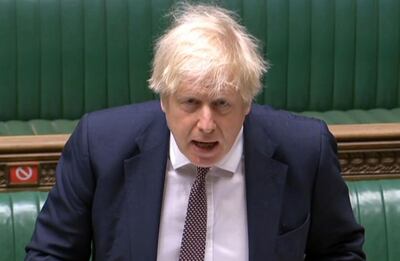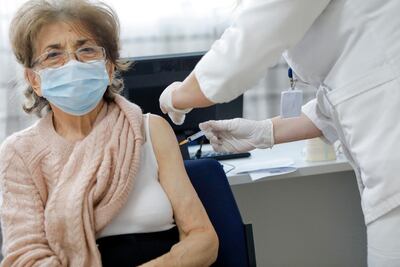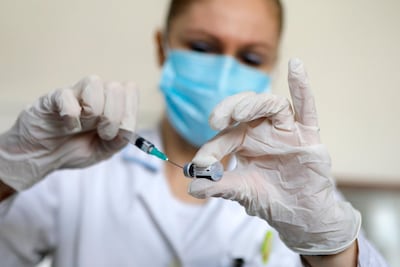Pfizer said on Friday it would temporarily reduce deliveries of its Covid-19 vaccine to Europe while it upgrades its production capacity.
In response, six European Union governments asked the executive EU Commission in a letter on Friday to put pressure on the company “to ensure stability and transparency of timely deliveries” of vaccines against Covid-19.
The letter, signed by the health ministers of Sweden, Denmark, Finland, Lithuania, Latvia and Estonia, said Pfizer/BioNTech had told them agreed vaccine deliveries in the coming weeks would be substantially reduced.
“This situation is unacceptable,” the letter said. “Not only does it impact the planned vaccination schedules, it also decreases the credibility of the vaccination process.”
The reduction in deliveries is due to Pfizer limiting output so it can upgrade production capacity to two billion vaccine doses per year from 1.3 billion currently.
Pfizer said it had to modify the production process and premises, for which it required regulatory approval.
“Although this will temporarily impact shipments in late January to early February, it will provide a significant increase in doses available for patients in late February and March,” Pfizer said.
Norway changes vaccine advice after deaths
Norway adjusted its advice on who should receive the Covid-19 vaccine after 13 deaths among frail, older people.
It said doctors should assess particularly vulnerable patients before offering inoculations.
On Thursday, the Norwegian Medicines Agency said 29 people had suffered side effects, 13 of them fatal. All the deaths occurred among patients in nursing homes and all were more than 80 years old.
Fever and nausea were listed as side effects that “may have led to the deaths of some frail patients”, Sigurd Hortemo of the Norwegian Medicines Agency said.
More than 30,000 people have received their first shot of the Pfizer/BioNTech or Moderna vaccine in Norway since the end of December, according to official figures.
“We are not alarmed by this. It is quite clear that these vaccines have very little risk, with a small exception for the frailest patients,” Steinar Madsen, the agency’s medical director, said.
“Doctors must now carefully consider who should be vaccinated. Those who are very frail and at the very end of life can be vaccinated after an individual assessment.”
Earlier this week, the Norwegian Institute of Public Health said: “Any side effects of the vaccine will be outweighed by a reduced risk of becoming seriously ill with Covid-19 for elderly, frail people.”
In a report, the Norwegian Medicines Agency said 21 women and eight men suffered side effects. Among those who survived, nine had serious side effects including allergic reactions, strong discomfort and severe fever. Less serious side effects included severe pain at the injection site.
Norway has reported 59,034 coronavirus cases and 521 deaths to date.
Across the world, officials expect deaths and other severe side effects to be reported during any mass vaccination campaign, given the huge numbers of people involved. But determining whether or not the vaccine has caused deaths can be challenging and requires that all other potential causes be ruled out first.
Britain and the US have also reported cases of side effects that had fatal consequences.
The European Medicines Agency said on Friday it will receive and consider monthly safety reports from companies authorised to sell vaccines, starting in January with the Pfizer/BioNTech drug.
British PM tells public to stay home as deaths soar
British Prime Minister Boris Johnson on Friday urged the public to obey the national lockdown as coronavirus deaths continued to rise steeply.
“Please really think twice before leaving the house this weekend and only do so if it’s absolutely necessary,” Mr Johnson said in a video posted on Twitter.
The prime minister was expected give a press conference later on Friday after the latest government figures showed a 50 per cent rise in weekly deaths, taking the total toll to more than 86,000, the highest in Europe.
Meanwhile, the number of positive cases reached nearly 3.3 million, although new infections fell seven per cent in the past week.
All of Britain is under tough lockdown restrictions and people are supposed to stay at home unless taking exercise or travelling for essential reasons such as childcare or work.
Officials believe the declining case rates are due to the stringent lockdown, but concede there will be a time lag before hospital admissions and deaths also drop.

In a bid to inoculate the most vulnerable against Covid-19, Britain is rapidly expanding inoculations.
It has issued more than three million doses as part of a drive to vaccinate four groups of especially vulnerable people by the middle of next month, and every adult by the autumn.
“Jab by jab, we will win this fight against Covid," Mr Johnson said.
The “extraordinary” national effort “is only going to accelerate,” he said
British imams urge Muslims to take vaccine amid fears over fake news
Imams across the UK will deliver sermons during Friday prayers to reassure worshippers about the safety of Covid-19 vaccines.
The co-ordinated effort follows reports that misinformation about the vaccines is spreading fast among Asian communities.
London Mayor Sadiq Khan said anecdotal evidence suggested there was “some hesitancy” among black London residents to be vaccinated.
Qari Asim, chairman of the Mosques and Imams National Advisory Board, said the message would be delivered in 100 mosques in the UK.

“My message to Muslim communities is to make an informed choice and take up the offer when their turn for being vaccinated comes. Don’t miss the opportunity by believing in fake news about the vaccines,” he said.
“It is our ethical duty to protect ourselves and others from potential harm. By taking the vaccine, we are protecting ourselves and others from being infected by this deadly virus that is sweeping through our country – and potentially saving lives.”
Among the myths circulating in the community are that people could be implanted with electronic tags during the inoculation process. Another is that the Pfizer/BioNTech vaccine can modify a person’s DNA.
Some Muslims and Hindus also believe, mistakenly, that the vaccine contains alcohol or animal products.
But the British Islamic Medical Association said the Pfizer/BioNTech and Oxford/AstraZeneca drugs contain no animal products.
Bryan Vernon, a UK medical ethicist, urged people from minority backgrounds to take the vaccine.
"What group of people would want to put members of the [minority ethnic] community at risk of serious death or illness? Consider whether [misinformation] has a malevolent or racist source," he told The National.




